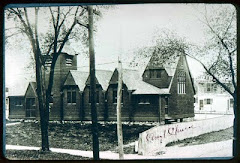Thursday, January 24, 2013
Are you called?
Seminarians facing ordination encounter the question of calling, which vicinage councils usually ask about. Being trained, gifted, and ready to do the work doesn't seem enough; yet how does one define and defend a "calling"? A few years ago I ready Gary Friesen's book Decision Making and the Will of God, which is the best study I've seen on the subject, and I'm in the process of reading The Call by Os Guiness. When Friesen came before his vicinage council they weren't pleased that he hadn't received an inner "impression," yet (and I mentioned this to him when he was at GCTS) what might they have said if he said "An angel came to me and told me to be a pastor"? There are two options: special revelation (the Scriptures) and direct revelation (God or an angel appearing to an individual), but nothing about "impressions" in Scripture, which is very subjective. Friesen's council even had trouble defining the "call to the ministry" when he asked for a definition. I decided to give it a try...
A calling is a vocation lived out as a willing, committed response to God's summons based on a godly desire to serve, prayerfully verified by others.
This may help somewhat, but ultimately we have the God-given wisdom, freedom, and responsibility to decide how to live for Him.
Monday, January 21, 2013
The origin of "Footprints"?
Was Spurgeon the Original Inspiration for the “Footprints” Poem?
The opening paragraph of a Spurgeon sermon from 1880:
Were you ever in a new trouble, one which was so strange that you felt that a similar trial had never happened to you and, moreover, you dreamt that such a temptation had never assailed anybody else? I should not wonder if that was the thought of your troubled heart. And did you ever walk out upon that lonely desert island upon which you were wrecked and say, “I am alone—alone—ALONE—nobody was ever here before me”? And did you suddenly pull up short as you noticed, in the sand, the footprints of a man? I remember right well passing through that experience—and when I looked, lo, it was not merely the footprints of a man that I saw, but I thought I knew whose feet had left those imprints. They were the marks of One who had been crucified, for there was the print of the nails. So I thought to myself, “If He has been here, it is no longer a desert island. As His blessed feet once trod this wilderness-way, it blossoms now like the rose and it becomes to my troubled spirit as a very garden of the Lord!”
—Charles Haddon Spurgeon, “The Education of the Sons of God” (Metropolitan Tabernacle: June 10, 1880).
Subscribe to:
Posts (Atom)






